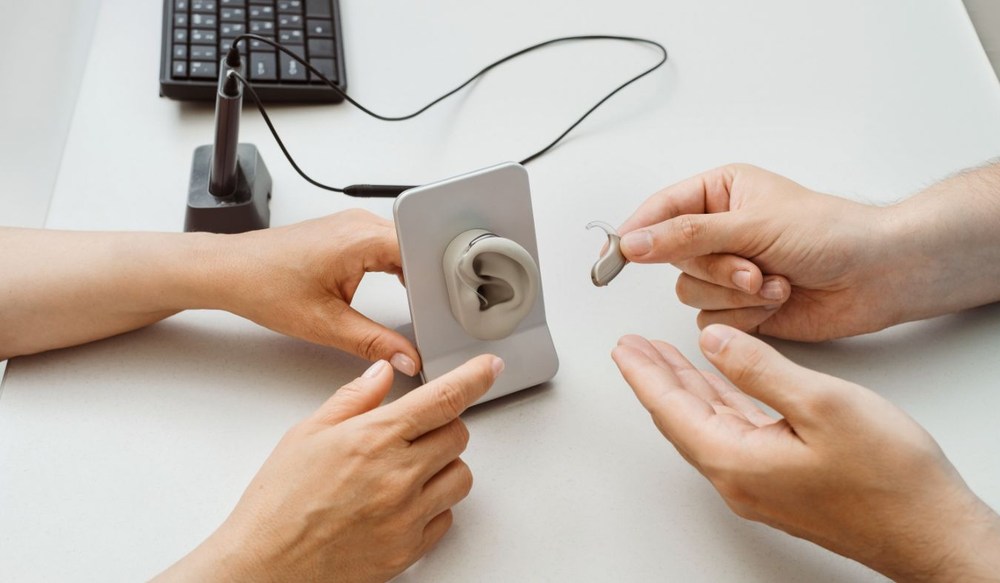Do I Need a Hearing Test? Screening Guidelines After 40
Most people don’t think about their hearing until they have to ask

By: admin | March 26, 2024
Dealing with hearing loss can be a bit tricky, but it’s crucial to understand that the journey towards better hearing doesn’t just stop when you get a hearing aid. Continuous care is a significant part of managing your hearing loss and it often goes unnoticed. This ongoing care includes regular appointments with your audiologist, necessary adjustments to your device and continued learning about your hearing loss. Just like any other health concern, treating hearing loss isn’t just about solving the immediate problem; it’s about maintaining and improving your overall auditory health over time. In this context, continuous care becomes a critical part of managing and living with hearing loss effectively.
Recognizing how hearing loss affects your daily life is a crucial step in managing it effectively. It can impact everything from your social interactions to your ability to perform certain tasks, making everyday life more challenging. However, with the right care and support from hearing health professionals, you can successfully manage these complexities and continue to lead a fulfilling life.
After understanding the effects of hearing loss, let’s consider the role that an audiologist plays in your path to improved hearing. These professionals are not just there to provide you with a device; they are your allies, your guides and your partners in managing and improving your auditory health.
An audiologist’s expertise extends beyond fitting you with a hearing aid. They continuously monitor your progress, make necessary adjustments to your device and educate you about managing your hearing loss effectively. Their role is crucial because they offer personalized care tailored to meet your unique needs and circumstances. So, rest assured, you’re not alone on this path; a dedicated audiologist is always there to support you every step of the way.
Now, let’s tackle a common misconception about hearing aids. Many people believe that these devices are a one-stop solution to all their hearing problems. However, this is not the case. Hearing aids are not magic wands that instantly restore perfect hearing. They are tools designed to aid your hearing, but they require time and patience to adjust to. Regular visits with your audiologist for fine-tuning and adjustments are necessary for the best results. So, while hearing aids can significantly improve your quality of life, they’re not an immediate fix but rather part of a comprehensive approach to managing your hearing health.
Let’s focus on the importance of routine check-ups and device fine-tuning in your hearing health management.
Now, let’s look at the relationship between continuous care and the optimal functionality of your hearing aid. Continuous care isn’t just about regular check-ups and device fine-tuning; it also encompasses educating yourself about your hearing loss and learning how to effectively use and maintain your hearing aid. This education is a key part of your ongoing care, as it equips you with the knowledge you need to make informed decisions about your auditory health.
Understanding how continuous care boosts the functionality of your hearing aid can significantly improve your quality of life. Regular visits with your audiologist ensure that any necessary adjustments are made to keep the device working at its best. Additionally, being educated about proper usage and maintenance helps prevent common issues that can affect performance. Ultimately, continuous care empowers you to take an active role in managing your hearing health for the best possible outcomes.
As we continue this discussion, let’s focus on the importance of patient awareness in managing hearing loss. Being aware and informed about your hearing loss is a powerful tool in managing it effectively. Understanding your situation can make a world of difference when it comes to hearing loss.
Have you ever found yourself wondering about the realities of living with hearing aids? Are there misconceptions clouding your understanding? Let’s set the record straight. One common misunderstanding is that hearing aids make everything sound overly loud. However, modern devices are designed to balance sounds, not just amplify them. They work to enhance speech while reducing background noise, providing a more natural listening experience.
Another misconception is that hearing aids are noticeable and unattractive. Today’s hearing aids are far from the bulky devices of the past. They come in a variety of styles and sizes, many of which are discreet and hardly visible. So, life with hearing aids doesn’t mean compromising on aesthetics or comfort!
Living with hearing loss can seem daunting at first, but by learning adaptive techniques, you can continue to lead a fulfilling life. These techniques aim to help you manage your hearing loss effectively and make everyday tasks less challenging.
One essential adaptive technique is learning how to use visual cues. Paying attention to people’s facial expressions and lip movements can aid in understanding conversations better. Additionally, positioning yourself in a well-lit area during discussions can make it easier for you to pick up these visual cues.
Transitioning from mastering adaptive techniques, we now turn our attention to the significant connection between mental well-being and effective hearing loss management. This relationship is often overlooked, but it’s an essential component in dealing with hearing loss successfully.
Mental well-being plays a critical role in how we manage and cope with health issues, including hearing loss. A positive mindset can greatly influence your journey towards improved auditory health. Here are some ways mental well-being intersects with efficient hearing loss management:
Let’s now shift our attention to the role of family support in enhancing the effectiveness of continuous care.
Family members can provide an invaluable source of emotional and practical support throughout your hearing loss management process. They can accompany you to appointments, assist with device maintenance and even help you practice adaptive techniques. This level of involvement not only eases your burden but also enhances the effectiveness of continuous care.
In addition, having a supportive family environment can significantly improve your mental well-being. Knowing that you have people who understand and support your journey towards improved auditory health can make the process less daunting and more manageable.
Finally, family members can play a key role in advocating for you in social situations. They can ensure that others are aware of your hearing loss and adapt their communication methods accordingly. This type of backing is crucial as it fosters better communication and enhances social interactions, making everyday life easier for you.
Transitioning from the importance of family support, let’s now focus on managing social interactions with confidence when you have hearing loss. Social situations can sometimes be challenging for those experiencing hearing loss, but with some practical advice, you can handle these situations with assurance.
Firstly, it’s important to inform others about your hearing loss. This simple step allows them to adapt their communication style to accommodate your needs. They might speak a little louder or ensure they’re facing you when talking, making conversations more manageable for you.
Secondly, positioning is key in social interactions. Try to position yourself in quieter areas during gatherings or meetings. This reduces background noise and makes it easier for you to follow conversations. Also, consider using assistive listening devices during large gatherings; these devices can significantly enhance your ability to hear and understand speech in noisy environments.
Remember that managing social interactions effectively is a crucial part of living with hearing loss. By being proactive and employing these strategies, you can continue to enjoy social activities with confidence and ease.
Navigating the path of hearing loss is a marathon, not a sprint. It requires patience, endurance and most importantly, continuous care. As we’ve discussed throughout this article, managing your hearing health involves regular check-ups with your audiologist for fine-tuning and adjustments to your device. It also includes educating yourself about your hearing loss and learning how to use adaptive techniques effectively.
But remember – you’re not alone on this journey. Our team at Great Lakes Bay Hearing is here to support you every step of the way. With our dedicated professionals by your side offering personalized care tailored to meet your unique needs, managing hearing loss becomes less daunting and more manageable.
If you have any questions or need further assistance in managing your hearing health effectively, don’t hesitate to reach out to us at our Midland, MI location. We’re just a phone call away at (989) 941-0627 and ready to guide you towards improved auditory health.

Most people don’t think about their hearing until they have to ask
By: admin | January 19, 2026

Hearing aid design directly affects whether people actually use them. If a
By: admin | November 18, 2025

Many people expect hearing aids to provide clear hearing in every
By: admin | September 24, 2025
